Category Archives: Machine Learning
Reinforcement Learning Real-world examples
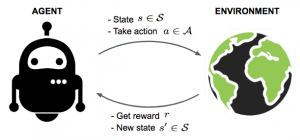
In this blog post, we’ll learn about some real-world / real-life examples of Reinforcement learning, one of the different approaches to machine learning where other approaches are supervised and unsupervised learning. Reinforcement learning is a type of machine learning that enables a computer system to learn how to make choices by being rewarded for its successes. This can be an extremely powerful tool for optimization and decision-making. It’s one of the most popular machine learning methods used today. Before looking into the real-world examples of Reinforcement learning, let’s quickly understand what is reinforcement learning. Introduction to Reinforcement Learning (RL) Reinforcement learning is an approach to machine learning in which the agents …
Generalized Linear Models Explained with Examples
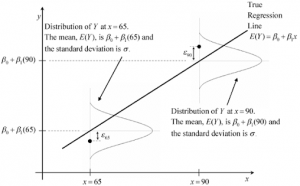
Generalized linear models (GLMs) are a powerful tool for data scientists, providing a flexible way to model data. In this post, you will learn about the concepts of generalized linear models (GLM) with the help of Python examples. It is very important for data scientists to understand the concepts of generalized linear models and how are they different from general linear models such as regression or ANOVA models. What are Generalized Linear Models? Generalized linear models (GLM) are a type of statistical models that can be used to model data that is not normally distributed. It is a flexible general framework that can be used to build many types of regression models, including …
Import or Upload Local File to Google Colab

Google Colab is a powerful tool that allows you to run Python code in the cloud. This can be useful for a variety of tasks, including data analysis and machine learning. One of the lesser known features of Google Colab is that you can also import or upload files stored on your local drive. In this article, we will show you how to read a file from your local drive in Google Colab using a quick code sample. There are a few reasons why you as a data scientist might need to learn how to read files from your local drive in Google Colab. One reason is that you may …
Ridge Classification Concepts & Python Examples

In machine learning, ridge classification is a technique used to analyze linear discriminant models. It is a form of regularization that penalizes model coefficients to prevent overfitting. Overfitting is a common issue in machine learning that occurs when a model is too complex and captures noise in the data instead of the underlying signal. This can lead to poor generalization performance on new data. Ridge classification addresses this problem by adding a penalty term to the cost function that discourage complexity. This results in a model that is better able to generalize to new data. In this post, you will learn about Ridge classifier in detail with the help of …
How to Create Pandas Dataframe from Numpy Array
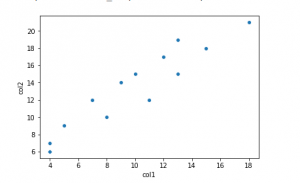
Pandas is a library for data analysis in Python. It offers a wide range of features, including working with missing data, handling time series data, and reading and writing data in different formats. Pandas also provides an efficient way to manipulate and calculate data. One of its key features is the Pandas DataFrame, which is a two-dimensional array with labeled rows and columns. A DataFrame is a table-like structure that contains columns and rows of data. Creating a Pandas DataFrame from a NumPy array is simple. In this post, you will get a code sample for creating a Pandas Dataframe using a Numpy array with Python programming. Step 1: Load …
Machine Learning Sklearn Pipeline – Python Example
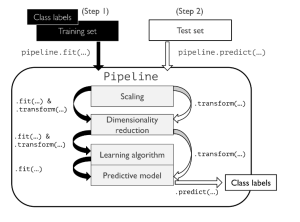
In this post, you will learning about concepts about machine learning (ML) pipeline and how to build ML pipeline using Python Sklearn Pipeline (sklearn.pipeline) package. Getting to know how to use Sklearn.pipeline effectively for training/testing machine learning models will help automate various different activities such as feature scaling, feature selection / extraction and training/testing the models. It is recommended for data scientists (Python) to get a good understanding of Sklearn.pipeline. Introduction to Machine Learning Pipeline & Sklearn.pipeline Machine Learning (ML) pipeline, theoretically, represents different steps including data transformation and prediction through which data passes. The outcome of the pipeline is the trained model which can be used for making the predictions. …
Sequence Models Quiz 1 – Test Your Understanding

Sequence modeling is extremely important for data scientists as it can be used in a variety of real-world applications. Sequence modeling is used in speech recognition, image recognition, machine translation, and text summarization. These are all important applications that data scientists must be familiar with. As a data scientist, it is important to have a good understanding of sequence modeling and how it can be used to solve real-world problems. In this blog, we’ll be looking at a quiz around sequence models, more specifically the different types of sequence models. This will help us understand how sequence models work and can be used in an interview situation. Before getting into …
Performance metrics for Time-series Forecasting models
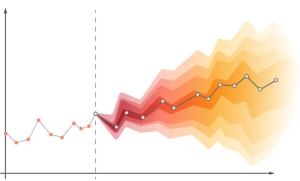
Time-series forecasting is a specific type of forecasting / predictive modeling that uses historical data to predict future trends in a particular time series. There are several different metrics that can be used to measure the accuracy and efficacy of a time-series forecasting model, including Mean Absolute Error (MAE), Root Mean Squared Error (RMSE), and others. By understanding these performance metrics, you can better assess the effectiveness of your time-series forecasting model and make necessary adjustments as needed. In this blog, you will learn about the different time-series forecasting model performance metrics and how to use them for model evaluation. Check out a related post – Different types of time-series …
Sample Dataset for Regression & Classification: Python
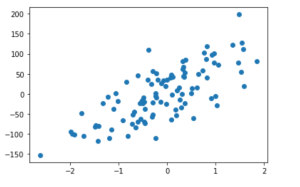
A lot of beginners in the field of data science / machine learning are intimidated by the prospect of doing data analysis and building regression (linear) & classification models in Python. But with an ability to create sample dataset using Python packages, you can practice your skills and build your confidence over a period of time. The technique demonstrated in this blog post to create and visualize / plot the sample dataset includes datasets that can be used for regression models such as linear regression and classification models such as logistic regression, random forest, SVM etc. You can use this technique to explore different methods for solving the same problem. …
Knowledge Graph Concepts & Machine Learning: Examples
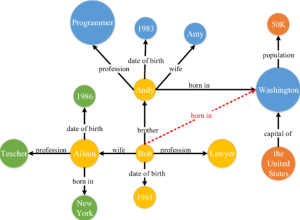
Knowledge graphs and machine learning are two important tools for understanding and making decisions in business. Knowledge graphs can be used to understand and model complex concepts, while machine learning is a process by which computers learn from data, without being explicitly programmed. Together, these two tools can be used to make better decisions in business by understanding the relationships between data points. In this blog, you will learn about the basics of knowledge graphs and machine learning, and how they can be used to improve decision making in business. What is a Knowledge Graph & how they can are used? A knowledge graph is a collection of data that …
AI / Machine learning (ML) Model Governance Framework

AI / Machine learning (ML) based solutions / applications have become increasingly important in business and industry. However, with the power to make decisions that can impact people’s lives comes a responsibility to use those tools ethically and responsibly. The machine learning model governance framework is designed to help businesses do just that. In this blog, you will learn about the AI / Machine Learning Model Governance framework, its benefits, and how you can implement it in your organization. What is AI / Machine learning (ML) model governance and why its important? Machine learning model governance is a set of process and related tools & frameworks that the businesses need …
Targeted Advertising & Machine Learning: Examples

Targeted advertising is nothing new. Businesses have been using targeted ads for years in order to try and increase sales. However, with the advent of machine learning, businesses are now able to target their ads more effectively than ever before. The importance of using machine learning for targeted advertising cannot be overstated. By using machine learning, businesses can target their ads more accurately and thus see a higher return on investment. This is because machine learning can take into account a variety of factors that humans would not be able to consider, such as browsing history and purchase history. As a business, it is important to stay ahead of the …
Linear Discriminant Analysis (LDA) Concepts & Examples
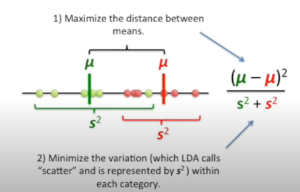
You may have heard of Linear Discriminant Analysis (LDA), but you’re not sure what it is or how it works. In the world of machine learning, Linear Discriminant Analysis (LDA) is a powerful algorithm that can be used to determine the best separation between two or more classes. With LDA, you can quickly and easily identify which class a particular data point belongs to. This makes LDA a key tool for solving classification problems. In this blog post, we will discuss the key concepts behind LDA and provide some examples of how it can be used in the real world! What is Linear Discriminant Analysis (LDA) and what are its …
100 Interview Questions for Deep Learning

If you’re looking for a job in deep learning, you’ll need to be prepared to answer some tough questions. In order to help you get started, we’ve put together a list of 100 interview questions for deep learning. While many of these questions are related to deep learning concepts, we have also listed several frameworks (Tensorflow, Pytorch, etc) related questions. By being prepared for these questions, you’ll be able to demonstrate your knowledge and expertise in this area, and increase your chances of landing the job! What is deep learning? How does machine learning differ from deep learning? What are the differences between shallow and deep learning? How does deep …
Who is a Data Scientist? Test your Knowledge

Do you know what a data scientist is? You may think you do, but take this quiz to find out for sure! Data scientists are essential to modern business and it’s important to know who they are and what they do. This quiz is just for fun, but it’s also a great opportunity to learn more about one of the most in-demand professions today. So put your data scientist knowledge to the test and see how well you really know this profession! And, feel free to share your thoughts if you disagree with the answer of any of the questions. Here are a few related posts on this topic: What …
Interns – Machine Learning Interview Questions & Answers: Set 1

This page lists down first set of machine learning / data science interview questions and answers for interns / freshers / beginners. If you are an intern or a fresher or a beginner in machine learning field, and, you are looking for some practice tests before appearing for your upcoming machine learning interview, these practice tests would prove to be very useful and handy. Machine Learning topics covered in Test In this set, some of the following topics have been covered: Machine learning fundamentals (Supervised and unsupervised learning algorithms) Different types of machine learning problems and related algorithms with examples Concepts related with regression, classification and clustering Practice Test (Questions …
I found it very helpful. However the differences are not too understandable for me